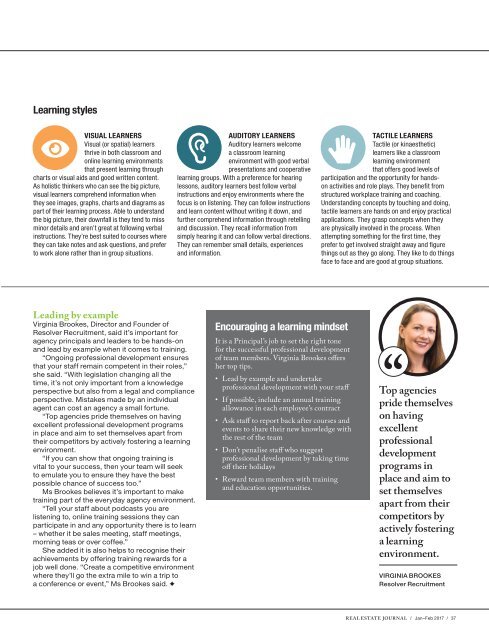REINSW Journal Jan-Feb 2017
The bi-monthly magazine from the Real Estate Institute of NSW
The bi-monthly magazine from the Real Estate Institute of NSW
You also want an ePaper? Increase the reach of your titles
YUMPU automatically turns print PDFs into web optimized ePapers that Google loves.
Learning styles<br />
VISUAL LEARNERS<br />
Visual (or spatial) learners<br />
thrive in both classroom and<br />
online learning environments<br />
that present learning through<br />
charts or visual aids and good written content.<br />
As holistic thinkers who can see the big picture,<br />
visual learners comprehend information when<br />
they see images, graphs, charts and diagrams as<br />
part of their learning process. Able to understand<br />
the big picture, their downfall is they tend to miss<br />
minor details and aren’t great at following verbal<br />
instructions. They’re best suited to courses where<br />
they can take notes and ask questions, and prefer<br />
to work alone rather than in group situations.<br />
AUDITORY LEARNERS<br />
Auditory learners welcome<br />
a classroom learning<br />
environment with good verbal<br />
presentations and cooperative<br />
learning groups. With a preference for hearing<br />
lessons, auditory learners best follow verbal<br />
instructions and enjoy environments where the<br />
focus is on listening. They can follow instructions<br />
and learn content without writing it down, and<br />
further comprehend information through retelling<br />
and discussion. They recall information from<br />
simply hearing it and can follow verbal directions.<br />
They can remember small details, experiences<br />
and information.<br />
TACTILE LEARNERS<br />
Tactile (or kinaesthetic)<br />
learners like a classroom<br />
learning environment<br />
that offers good levels of<br />
participation and the opportunity for handson<br />
activities and role plays. They benefit from<br />
structured workplace training and coaching.<br />
Understanding concepts by touching and doing,<br />
tactile learners are hands on and enjoy practical<br />
applications. They grasp concepts when they<br />
are physically involved in the process. When<br />
attempting something for the first time, they<br />
prefer to get involved straight away and figure<br />
things out as they go along. They like to do things<br />
face to face and are good at group situations.<br />
Leading by example<br />
Virginia Brookes, Director and Founder of<br />
Resolver Recruitment, said it’s important for<br />
agency principals and leaders to be hands-on<br />
and lead by example when it comes to training.<br />
“Ongoing professional development ensures<br />
that your staff remain competent in their roles,”<br />
she said. “With legislation changing all the<br />
time, it’s not only important from a knowledge<br />
perspective but also from a legal and compliance<br />
perspective. Mistakes made by an individual<br />
agent can cost an agency a small fortune.<br />
“Top agencies pride themselves on having<br />
excellent professional development programs<br />
in place and aim to set themselves apart from<br />
their competitors by actively fostering a learning<br />
environment.<br />
“If you can show that ongoing training is<br />
vital to your success, then your team will seek<br />
to emulate you to ensure they have the best<br />
possible chance of success too.”<br />
Ms Brookes believes it’s important to make<br />
training part of the everyday agency environment.<br />
“Tell your staff about podcasts you are<br />
listening to, online training sessions they can<br />
participate in and any opportunity there is to learn<br />
– whether it be sales meeting, staff meetings,<br />
morning teas or over coffee.”<br />
She added it is also helps to recognise their<br />
achievements by offering training rewards for a<br />
job well done. “Create a competitive environment<br />
where they’ll go the extra mile to win a trip to<br />
a conference or event,” Ms Brookes said.<br />
Encouraging a learning mindset<br />
It is a Principal’s job to set the right tone<br />
for the successful professional development<br />
of team members. Virginia Brookes offers<br />
her top tips.<br />
• Lead by example and undertake<br />
professional development with your staff<br />
• If possible, include an annual training<br />
allowance in each employee’s contract<br />
• Ask staff to report back after courses and<br />
events to share their new knowledge with<br />
the rest of the team<br />
• Don’t penalise staff who suggest<br />
professional development by taking time<br />
off their holidays<br />
• Reward team members with training<br />
and education opportunities.<br />
Top agencies<br />
pride themselves<br />
on having<br />
excellent<br />
professional<br />
development<br />
programs in<br />
place and aim to<br />
set themselves<br />
apart from their<br />
competitors by<br />
actively fostering<br />
a learning<br />
environment.<br />
VIRGINIA BROOKES<br />
Resolver Recruitment<br />
REAL ESTATE JOURNAL / <strong>Jan</strong>–<strong>Feb</strong> <strong>2017</strong> / 37


